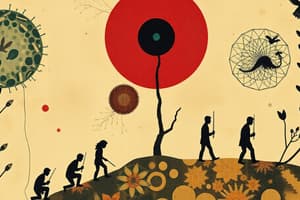Podcast
Questions and Answers
Which branch of biology focuses on the study of microorganisms?
Which branch of biology focuses on the study of microorganisms?
- Microbiology (correct)
- Molecular Biology
- Ecology
- Biochemistry
What is the process by which individuals with favorable traits are more likely to survive and reproduce?
What is the process by which individuals with favorable traits are more likely to survive and reproduce?
- Mutation
- Gene Flow
- Natural Selection (correct)
- Genetic Drift
What is the sequence of organisms that eat other organisms for energy?
What is the sequence of organisms that eat other organisms for energy?
- Food Chain (correct)
- Food Web
- Ecosystem
- Nutrient Cycling
Flashcards are hidden until you start studying
Study Notes
Branches of Biology
- Botany: study of plants
- Zoology: study of animals
- Microbiology: study of microorganisms (bacteria, viruses, etc.)
- Ecology: study of interactions between organisms and their environment
- Biochemistry: study of chemical processes within living organisms
- Molecular Biology: study of biological molecules and their interactions
Cells
- Cell Theory: all living organisms are composed of cells, cells are the basic unit of life, and all cells come from pre-existing cells
- Cell Structure: cell membrane, cytoplasm, nucleus, mitochondria, ribosomes, lysosomes
- Cell Functions: metabolism, growth, reproduction, response to stimuli, maintenance of homeostasis
Genetics
- Mendelian Genetics: study of inheritance patterns of traits based on Mendel's laws
- DNA Structure: double helix model, nucleotides (A, C, G, T), genes, chromosomes
- Genetic Code: sequence of nucleotides determines amino acid sequence of proteins
- Genetic Variation: mutations, genetic recombination, gene expression
Evolution
- Theory of Evolution: species change over time through natural selection, genetic drift, mutation, and gene flow
- Natural Selection: process by which individuals with favorable traits are more likely to survive and reproduce
- Species: group of organisms that can interbreed and produce fertile offspring
- Fossil Record: chronological record of evolution through fossil evidence
Ecosystems
- Ecosystem: community of living organisms and their physical environment
- Food Chain: sequence of organisms that eat other organisms for energy
- Food Web: network of food chains
- Energy Flow: energy from sunlight is transferred from one organism to another through food chains and webs
- Nutrient Cycling: nutrients are recycled through ecosystems through decomposition and nutrient uptake
Branches of Biology
- Botany is the study of plants
- Zoology is the study of animals
- Microbiology is the study of microorganisms, including bacteria and viruses
- Ecology is the study of interactions between organisms and their environment
- Biochemistry is the study of chemical processes within living organisms
- Molecular Biology is the study of biological molecules and their interactions
Cells
- The cell theory states that all living organisms are composed of cells, cells are the basic unit of life, and all cells come from pre-existing cells
- A cell consists of a cell membrane, cytoplasm, nucleus, mitochondria, ribosomes, and lysosomes
- Cell functions include metabolism, growth, reproduction, response to stimuli, and maintenance of homeostasis
Genetics
- Mendelian Genetics studies the inheritance patterns of traits based on Mendel's laws
- DNA has a double helix structure, consisting of nucleotides (A, C, G, T), genes, and chromosomes
- The genetic code determines the sequence of nucleotides that specifies the amino acid sequence of proteins
- Genetic variation occurs through mutations, genetic recombination, and gene expression
Evolution
- The theory of evolution states that species change over time through natural selection, genetic drift, mutation, and gene flow
- Natural selection is the process by which individuals with favorable traits are more likely to survive and reproduce
- A species is a group of organisms that can interbreed and produce fertile offspring
- The fossil record provides a chronological record of evolution through fossil evidence
Ecosystems
- An ecosystem is a community of living organisms and their physical environment
- A food chain is a sequence of organisms that eat other organisms for energy
- A food web is a network of food chains
- Energy flows from one organism to another through food chains and webs, originating from sunlight
- Nutrient cycling occurs through decomposition and nutrient uptake, recycling nutrients through ecosystems
Studying That Suits You
Use AI to generate personalized quizzes and flashcards to suit your learning preferences.




